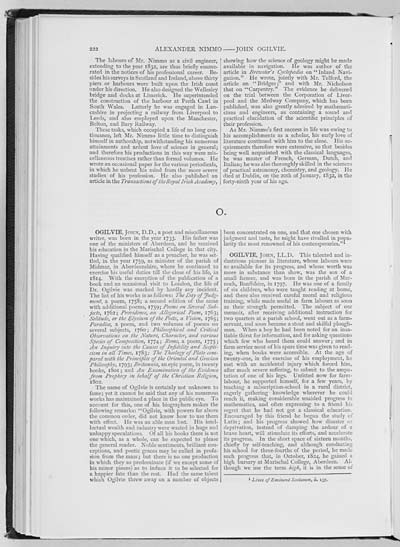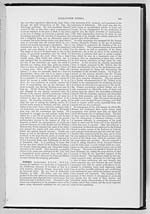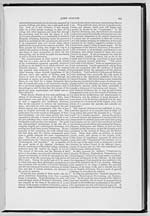222
The labours of Mr. Nimmo as a civil engineer,
extending to the year 1832, are thus briefly enume-
rated in the notices of his professional career. Be-
sides his surveys in Scotland and Ireland, above thirty
piers or harbours were built upon the Irish coast
under his direction. He also designed the Wellesley
bridge and docks at Limerick. He superintended
the construction of the harbour at Perth Cawl in
South Wales. Latterly he was engaged in Lan-
cashire in projecting a railway from Liverpool to
Leeds, and also employed upon the Manchester,
Bolton, and Bury Railway.
These tasks, which occupied a life of no long con-
tinuance, left Mr. Nimmo little time to distinguish
himself in authorship, notwithstanding his numerous
attainments and ardent love of science in general;
and therefore his productions in this way were mis-
cellaneous treatises rather than formal volumes. He
wrote an occasional paper for the various periodicals,
in which he unbent his mind from the more severe
studies of his profession. He also published an
article in the Transactions of the Royal Irish Academy,
showing how the science of geology might be made
available in navigation. He was author of the
article in Brewster's Cyclopedia on "Inland Navi-
gation." He wrote, jointly with Mr. Telford, the
article on "Bridges;" and with Mr. Nicholson
that on "Carpentry." The evidence he delivered
on the trial between, the Corporation of Liver-
pool and the Medway Company, which has been
published, was also greatly admired by mathemati-
cians and engineers, as containing a sound and
practical elucidation of the scientific principles of
their profession.
As Mr. Nimmo's first success in life was owing to
his accomplishments as a scholar, his early love of
literature continued with him to the close. His ac-
quirements therefore were extensive, so that besides
being well acquainted with the classical languages,
he was master of French, German, Dutch, and
Italian; he was also thoroughly skilled in the sciences
of practical astronomy, chemistry, and geology. He
died at Dublin, on the 20th of January, 1832, in the
forty-ninth year of his age.
O.
OGILVIE, JOHN, D.D., a poet and miscellaneous
writer, was born in the year 1733. His father was
one of the ministers of Aberdeen, and he received
his education in the Marischal College in that city.
Having qualified himself as a preacher, he was set-
tled, in the year 1759, as minister of the parish of
Midmar, in Aberdeenshire, where he continued to
exercise his useful duties till the close of his life, in
1814. With the exception of the publication of a
book and an occasional visit to London, the life of
Dr. Ogilvie was marked by hardly any inciden't.
The list of his works is as follows: The Day of Judg-
ment, a poem, 1758; a second edition of the same
with additional poems, 1759; Poems on Several Sub-
jects, 1762; Providence, an Allegorical Poem, 1763;
Solitude, or the Elysium of the Poets, a Vision, 1765;
Paradise, a poem, and two volumes of poems on
several subjects, 1760; Philosophical and Critical
Observations on the Nature, Character, and -various
Species of Composition, 1774; Rome, a poem, 1775;
An Inquiry into the Causes of Infidelity and Scepti-
cism in all Times, 1783; The Theology of Plato com-
pared with the Principles of the Oriental and Grecian
Philosophy, 1793; Britannia, an epic poem, in twenty
books, 1801; and An Examination of the Evidence
from Prophecy in behalf of the Christian Religion,
1802.
The name of Ogilvie is certainly not unknown to
fame; yet it cannot be said that any of his numerous
works has maintained a place in the public eye. To
account for this, one of his biographers makes the
following remarks: "Ogilvie, with powers far above
the common order, did not know how to use them
with effect. He was an able man lost. His intel-
lectual wealth and industry were wasted in huge and
unhappy speculations. Of all his books there is not
one which, as a whole, can be expected to please
the general reader. Noble sentiments, brilliant con-
ceptions, and poetic graces may be culled in profu-
sion from the mass; but there is no one production
in which they so predominate (if we except some of
his minor pieces) as to induce it to be selected for
a happier fate than the rest. Had the same talent
which Ogilvie threw away on a number of objects
been concentrated on one, and that one chosen with
judgment and taste, he might have rivalled in popu-
larity the most renowned of his contemporaries."1
OGILVIE, JOHN, LL.D. This talented and in-
dustrious pioneer in literature, whose labours were
so available for its progress, and whose worth was
more in substance than show, was the son of a
small farmer, and was born in the parish of Mar-
noch, Banffshire, in 1797. He was one of a family
of six children, who were taught reading at home,
and there also received careful moral and religious
training, while made useful in farm labours as soon
as their strength permitted. The subject of our
memoir, after receiving additional instruction for
two quarters at a parish school, went out as a farm-
servant, and soon became a stout and skilful plough-
man. When a boy he had been noted for an insa-
tiable thirst for information, and for asking questions
which few who heard them could answer; and in
farm service most of his spare time was given to read-
ing, when books were accessible. At the age of
twenty-one, in the exercise of his employment, he
met with an accidental injury which forced him,
after much severe suffering, to submit to the ampu-
tation of one of his legs. Unfitted now for farm-
labour, he supported himself, for a few years, by
teaching a subscription-school in a rural district,
eagerly gathering knowledge wherever he could
reach it, making considerable unaided progress in
mathematics, and often expressing to a friend his
regret that he had not got a classical education.
Encouraged by this friend he began the study of
Latin; and his progress showed how disaster or
deprivation, instead of damping the ardour of a
brave heart, will stimulate its efforts, and accelerate
its progress. In the short space of sixteen months,
chiefly by self-teaching, and although conducting
his school for three-fourths of the period, he made
such progress that, in October, 1824, he gained a
high bursary at Marischal College, Aberdeen. Al-
though we use the term high, it is in the sense of
1 Lives of Eminent Scotsmen, ii. 137.

![]() Universal Viewer |
Universal Viewer | ![]() Mirador |
Large image | Transcription
Mirador |
Large image | Transcription
![]()

